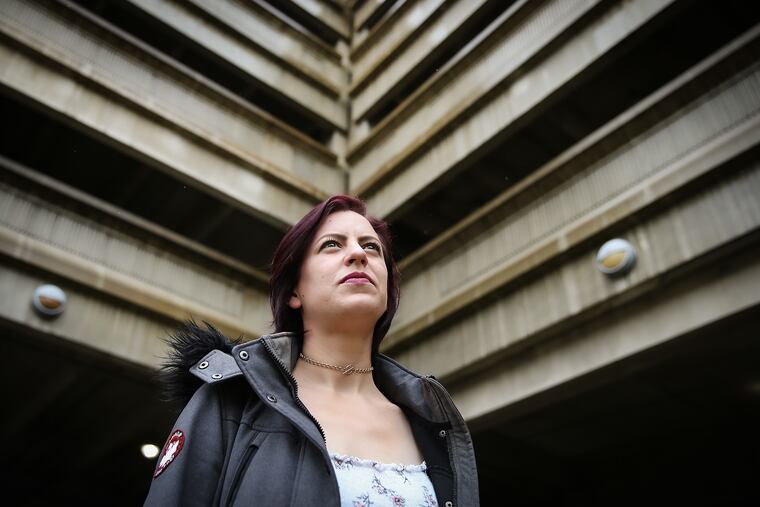For this Cherry Hill mom, home was the dirt outside the Frankford El stop. Now she helps others escape life on the streets. | Mike Newall
There was little hope in Becky Shuhart then. Only an emptiness. A hole in her heart that nothing could fill.

Becky Shuhart was living in a scraggly patch of dirt and bushes next to the Frankford Transportation Center, across from the gates of Cedar Hill Cemetery. She stayed there for more than half a year, sleeping fitfully in the cover of the flowering bushes, without even a photo of her son, Caiden, then nearly 2 and living with his grandparents. She couldn’t bear to look at his face.
She was supposed to have gotten through the hard part. After all, she had kicked the heroin addiction and was in recovery, looking for work. She was dutifully attending the methadone clinic that kept her cravings at bay, a goal she never thought she could reach.
And still, after all that, Becky found herself huddled and scared and living outside a train station. She tried to resign herself to the fact that maybe this was as far as she would get. As if the patch of grass against a concrete wall was home.
A hole in her heart
Becky’s story is one of powerful perseverance, and one that illustrates the complexity of addiction and recovery. When we talk about recovery, sobriety is often painted as the end of the story. But support for people in addiction can’t stop when their drug use does. The goal has to be rebuilding a life — a full one.
And Becky Shuhart set about rebuilding hers from a patch of dirt next to the transportation center. Incredibly, she had already come far from what she considered her lowest point.
She grew up in Bucks County, an athlete who at a young age was diagnosed with an anxiety disorder. College drinking led to pills, and then heroin.
Eventually, she was homeless in Kensington, where the rhythm of the days fell into an endless uniformity: waking up dopesick before dawn, and selling needles for her next hit until after dusk at the bottom of the El stop at Somerset and Kensington.
One day, her father found her there. “I was 80 pounds and looked like death, and hadn’t showered in a month,” she said. “It was the first time I ever saw my dad cry.”
She refused to go with him. She had convinced herself that her family was better off without her.
There was little hope in Becky Shuhart then. Only an emptiness. A hole in her heart that nothing could fill.
A newfound purpose to live
But that year, when she was offered treatment at Prevention Point, the local needle exchange, Becky grasped at the chance. The help gave her a newfound purpose to live. But those first steps of recovery, as momentous as they were, still left her homeless at the transportation center. Many frigid nights, she could rely only on the kindness of a driver on the Number 14 bus route who let her sleep in the back of her bus as it trundled to the Oxford Valley Mall.
Becky kept taking steps: A $7-an-hour job at Dunkin’ Donuts. A studio apartment in the Northeast — leased by a slumlord, but heaven to her. And then a spot in a program called “Achievement through Counseling and Treatment” at JEVS Human Services, a local social service agency. Staffers there eventually encouraged her to become a certified peer specialist — someone with experience of addiction who can help others. She won a scholarship from the city to get certified. Eventually, she got a position at the treatment center that had helped her, and now works in another treatment program in Philadelphia.
“When I first met her, she was fragile, not sure of herself, but now she is strong,” said Margie Rodriguez, a program staffer. “Anyone who sees her and sees her story can see strength and hope.” Drawing on the success of people like Becky, for whom a job was an important foothold in recovery, JEVS is running a new program dedicated to helping people in recovery get employment.
On Friday, Becky, 30, received an award for that success from JEVS at a ceremony attended by Mayor Jim Kenney and Sen. Bob Casey. Her story needs to be told — and it’s one that everyone needs to hear in a time when some still question the worth of harm reduction measures that keep people alive until they’re ready to begin a recovery journey.
“It makes me sick to my stomach when I see comments like ‘Just let those junkies die,’ ” Becky said. “That stigma is what’s keeping a lot of people sick and on the street.” It’s what kept her on the street.
On Thursday, she went back for the first time to the patch of dirt where she’d slept. It felt surreal. As if it had happened to someone else.
In May, she surprised Caiden, now 8, with a home in Cherry Hill. The boy cried with happiness when she pulled up to the house. They set up his room that night, with Fortnite posters and a desk. The next morning, Caiden crawled into bed under the covers with his mother, content.
And this, Becky Shuhart knew, was home.